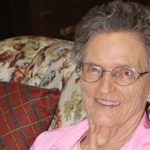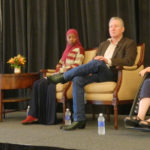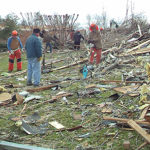ARLINGTON, Va. (RNS)—Seated at a table with other chaplains who have comforted grieving military families, retired Army Chaplain John Schumacher held a red rose in his hands before he passed it along, pausing to remember those who had died on the battlefield.
 The unique role of military chaplains is evident in this bronze statue in the Armed Forces Chaplaincy Center’s Chaplain Corps Prayer Garden at South Carolina’s Fort Jackson. (BP Photo by Roger S. Oldham)Schumacher then took the rose and added it to a memorial wreath. Two days later, he and another chaplain placed the wreath at the Tomb of the Unknowns in Arlington National Cemetery.
The unique role of military chaplains is evident in this bronze statue in the Armed Forces Chaplaincy Center’s Chaplain Corps Prayer Garden at South Carolina’s Fort Jackson. (BP Photo by Roger S. Oldham)Schumacher then took the rose and added it to a memorial wreath. Two days later, he and another chaplain placed the wreath at the Tomb of the Unknowns in Arlington National Cemetery.
“I’ve been in combat. I’ve been with a lot of wounded men. I’ve been with dead men who were my friends,” said Schumacher, a two-tour Vietnam veteran. “Chaplains give so much and carry all that pain with them for so long. It was such a tremendous honor to feel some of that pain kind of ooze out a little bit.”
The memorial ceremony, organized for the first time by the National Association of Evangelicals Chaplains Commission, gave chaplains, who usually help others grieve, a chance to grieve themselves. This often-unspoken need now is being addressed across the country, with new training and a greater emphasis on mentoring. As these initiatives take hold, chaplains working in hospitals, hospice and the military are finding ways to cope.
 Valerie Storms, president of the Association of Professional Chaplains. (RNS Photo courtesy of Johnson’s Photography, Gainesville, Fla.)Valerie Storms, president of the Association of Professional Chaplains, said many chaplains’ organizations, including Catholic and Jewish groups, tell chaplains to take care of themselves as well as others. Self-care ranges from knowing a chaplain they can contact on the spur of the moment to developing hobbies—from running to making jewelry—to maintain their spiritual and emotional equilibrium.
Valerie Storms, president of the Association of Professional Chaplains. (RNS Photo courtesy of Johnson’s Photography, Gainesville, Fla.)Valerie Storms, president of the Association of Professional Chaplains, said many chaplains’ organizations, including Catholic and Jewish groups, tell chaplains to take care of themselves as well as others. Self-care ranges from knowing a chaplain they can contact on the spur of the moment to developing hobbies—from running to making jewelry—to maintain their spiritual and emotional equilibrium.
Storms, who is affiliated with the Alliance of Baptists, tends to her garden to help her through tough days as the manager of chaplaincy care at Moffitt Cancer Center in Tampa, Fla.
“I can go mow my lawn and edge my lawn and trim my bushes, and I see what’s done,” she said. “When you deal with people, you don’t often see the results of your work.”
Kristin Lindholm Gumminger, who teaches communication at Trinity International University in Illinois, said hospice chaplains “debrief” with similar personal rituals or by talking with a professional counselor. In her 2008 dissertation on hospice chaplains, one told her personal grief was a “constant companion.”
Gumminger is developing a workshop to help hospice chaplains. Others are working to help chaplains recognize and improve the ways they deal with grief.
Sign up for our weekly edition and get all our headlines in your inbox on Thursdays
Later this year, the U.S. Army Chaplain Center and School in South Carolina will introduce a new training session developed by the University of Georgia that includes “secondary traumatic stress” among chaplains and grief counselors. The Army’s chief of chaplains has encouraged a “Care to Caregiver” initiative that matches retired chaplains to serve as mentors to younger chaplains.
 Chaplain (Lt. Col.) Milton Johnson. (RNS Photo courtesy of U.S. Army)Chaplain Milton Johnson, a soldier and family minister at Fort Sam Houston in San Antonio, said he relies on fellow chaplains, his wife and pastors of his Seventh-day Adventist denomination to help him channel his grief—including when he lost his running buddy to suicide.
Chaplain (Lt. Col.) Milton Johnson. (RNS Photo courtesy of U.S. Army)Chaplain Milton Johnson, a soldier and family minister at Fort Sam Houston in San Antonio, said he relies on fellow chaplains, his wife and pastors of his Seventh-day Adventist denomination to help him channel his grief—including when he lost his running buddy to suicide.
But the new initiatives put a sharper focus on the need for chaplains to get help as they suffer along with their comrades, he said. Chaplains need to heed the lesson of flight attendants who warn airline passengers to put a breathing mask on themselves before others, he said.
“With chaplains and other professionals, sometimes it’s just the opposite. We have a tendency to put … (the mask) on everybody else first and then put … (it) on self, and that’s really not the most healthy way to take care of self,” he said. “I think we are turning the corner on that. I think the paradigm is shifting.”
 Chaplain Robert A. Miller, an instructor at the U.S. Army Medical Department Center and School in San Antonio. (RNS Photo courtesy of U.S. Army)Chaplain Robert A. Miller, an instructor at the U.S. Army Medical Department Center and School in San Antonio, recalled a 2012 remembrance ceremony for 9/11 on a Kuwait City beach, where chaplains and other soldiers were given carnations, told to recall those they had served and lost, and watch their flowers drift away into the surf.
Chaplain Robert A. Miller, an instructor at the U.S. Army Medical Department Center and School in San Antonio. (RNS Photo courtesy of U.S. Army)Chaplain Robert A. Miller, an instructor at the U.S. Army Medical Department Center and School in San Antonio, recalled a 2012 remembrance ceremony for 9/11 on a Kuwait City beach, where chaplains and other soldiers were given carnations, told to recall those they had served and lost, and watch their flowers drift away into the surf.
“I saw chaplains and soldiers alike shedding tears, embracing one another and recognizing it’s OK to share the fact that all of us do grieve, all of us suffer loss,” said Miller, a Southern Baptist. “We cannot change it, but we cannot afford to let it change us so we can no longer be effective.”
Steven Spidell has measured some of that toll. In a 2009 survey, he found one-fifth of health care chaplains reported “disenfranchised grief,” or grief that was not supported in the workplace.
“Clergy are trained to be caregivers—that’s what we’re hired to do,” said Spidell, a staff chaplain at Houston Methodist West Hospital. “That we would need care is a foreign concept, I think, to most faith groups.”
 Steven Spidell, a staff chaplain at Houston Methodist West Hospital.Spidell finds his job most difficult when he cares for a family that suddenly and unexpectedly lost a relative at the hospital—“sobbing and yelling and screaming and are just breaking down because their pain is so intense.”
Steven Spidell, a staff chaplain at Houston Methodist West Hospital.Spidell finds his job most difficult when he cares for a family that suddenly and unexpectedly lost a relative at the hospital—“sobbing and yelling and screaming and are just breaking down because their pain is so intense.”
Such an episode leaves him “physically and emotionally exhausted,” and sometimes it takes days for him to admit how tough it was. But he noted he is grateful for the time he spends with a family, which moves on to a funeral without him.
“I’m on to the next code blue,” he said. “My job continues.”














We seek to connect God’s story and God’s people around the world. To learn more about God’s story, click here.
Send comments and feedback to Eric Black, our editor. For comments to be published, please specify “letter to the editor.” Maximum length for publication is 300 words.